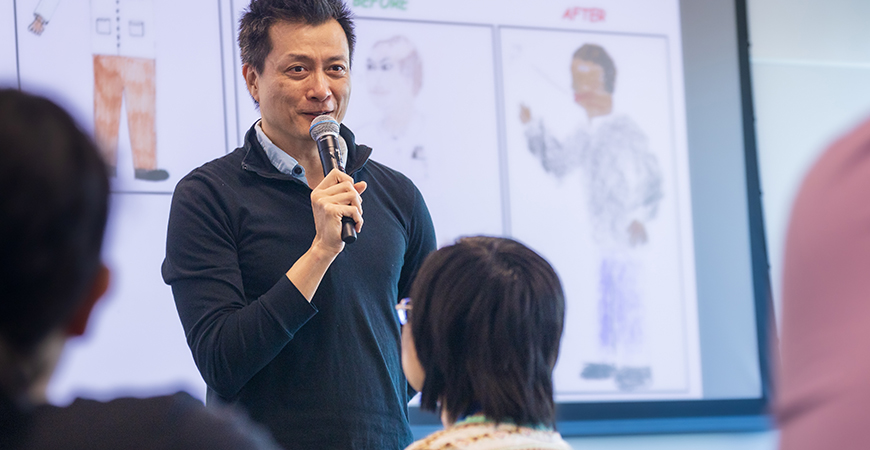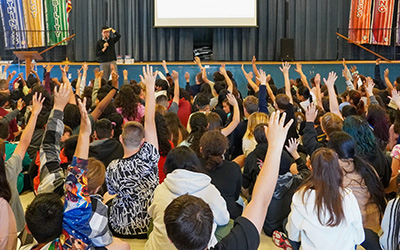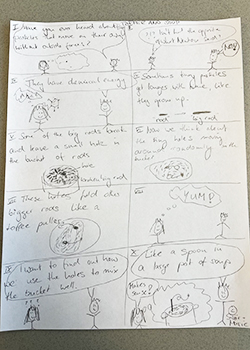
“Raise your hands if you want to know a secret,” acclaimed author and cartoonist Jorge Cham instructed a crowd of young children. Hundreds of tiny arms shot up in unison toward the cafeteria ceiling.
“Butterflies drink with a straw,” he said. Bustling with excitement, the students expressed their astonishment with “oohs” and “wows.”
Cham spoke to more than 500 elementary school students during two assemblies April 18 at Ada Givens Elementary School in Merced. The first gathering focused on his children’s TV series “Elinor Wonders Why,” about a curious rabbit that goes on adventures with her friends to gain knowledge by questioning and exploring. Cham co-writes and co-produces the PBS Kids series and accompanying books constructed to make science relatable to children.
His visit was co-hosted by UC Merced’s Secure Water Future, a collaborative of investigators who aim to improve agricultural and environmental water resilience, and the campus’s Graduate Division, to provide engaging science programming to audiences on and off campus.
“One of Secure Water Future's goals is to increase science literacy in our local communities, especially with populations that might not have the same level of educational access,” said Sarah Naumes, senior director of Interdisciplinary Research and Strategic Initiatives. “We want to ensure that kids in the states where we work — California, New Mexico and Utah — know that science can be fun and engaging.
“This was an investment in the future.”

During the second assembly, Cham detailed his latest book, “Oliver's Great Big Universe,” for students in third through sixth grade. The main character, named after his son, decides to write a book about the universe by telling funny stories about what happened to him at school and home.
A lifelong doodler, Cham asked for a volunteer from the audience and proceeded to draw a pupil named Emily alongside his Oliver character on a tablet projected for all to see. The scene from the book he described takes place in the school cafeteria and ends with students fleeing after an explosion of sorts.
“That’s how scientists think the universe started,” he explained. “Fourteen billion years ago…”
Sparking their imaginations, he went on to explain more about space, black holes and the speed of light using illustrations and drawing another student volunteer. The captivated children headed back to their classrooms with an assignment to share with their caregivers two things they learned.

Cham’s work spans the range of preschoolers to adults.
In the afternoon, he led an interactive science communication workshop at UC Merced geared toward graduate students and researchers. He explained the need to boil down their research into simpler terms to communicate with others not in their fields of study.
Marie Buhl, an international student from Germany and third-year Ph.D. candidate in environmental systems, found the training enlightening.
“I often have trouble explaining my research, especially when needing to translate to my parents and siblings. Sometimes I do not even know the German equivalent for some research jargon I am using in English,” Buhl said. “The workshop really opened my eyes to how important good science communication is.”
Cham assigned an exercise, asking each student to write a paragraph about their research. Then they broke into pairs and tried to explain it to one another using only the 1,000 most common words in the English language with the help of a text editing app.
Buhl partnered with a friend who had recently tried to explain his research to her, but she couldn’t grasp it.
“During the exercise, I had a little lightbulb moment (with the help of some food analogies),” she said. “If you are mindful, a short and simple explanation really is not difficult. But my biggest takeaway is that while I want to communicate in easy-to-understand ways, I also want to convince my audience that what I am doing is still complex, novel and difficult. It is all about the balance.”
One of Secure Water Future's goals is to increase science literacy in our local communities, especially with populations that might not have the same level of educational access.
Cham is well-known in higher education circles worldwide for creating “Piled Higher and Deeper” while earning his Ph.D. in mechanical engineering from Stanford University. “PHD,” for short, is a popular comic strip caricaturing his grad school experiences and those of countless others.
His final event of the day offered a bit of levity. He took the stage at The Partisan in downtown Merced for a comedic performance for graduate students, which faculty members also found relatable.
The crowd laughed and nodded as he humorously addressed the sources of stress and anxiety in grad school.
“When he showed his comic about statistics classes, I thought ‘yup, that’s exactly what it feels like,’” Buhl said. “I am taking a Bayesian stats class this semester and had an absolutely confusing discussion with the professor on causation and correlation just the day before.”
Cham explored the myth of procrastination, admitting he created PHD Comics while procrastinating on his research.
“I argue that procrastination and laziness are not the same. Laziness is when you don't want to do anything. Procrastination is when you just don't want to do it … now,” Cham said.
Fortunately for him, it all worked out.
“It was a thrill to co-host Jorge Cham during our campus Graduate Student Appreciation Week,” Vice Provost and Graduate Dean Hrant Hratchian said. “He is insightful and entertaining, relating his experiences and knowledge while making a connection with his audiences.”
Brenda Ortiz

Senior Public Information Representative
Office: (209) 228-4203
Mobile: (209) 628-8263






